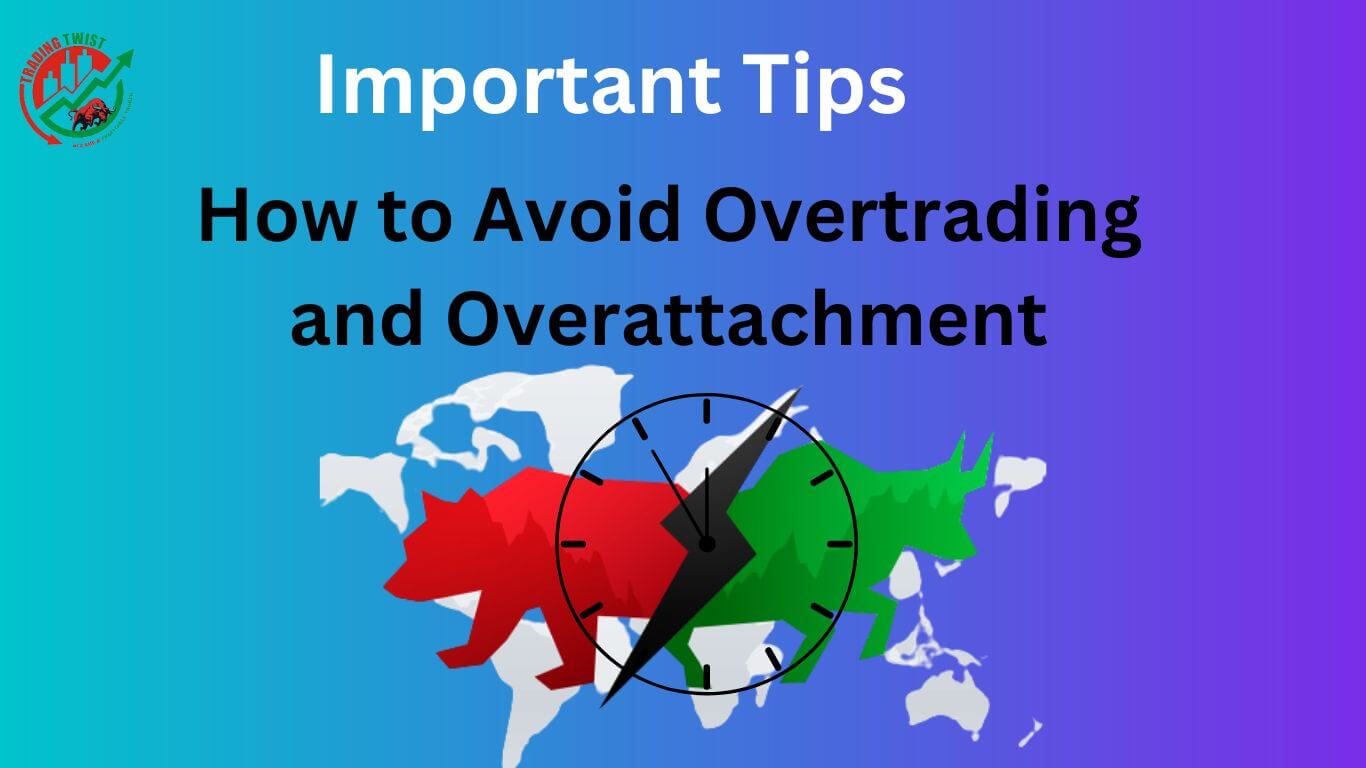
Each person experiences it. Your attention has been captured by what was initially a straightforward trade day. You obsessively monitor each tick on your stocks and make constant deals. You start to feel overwhelmed, stopping abruptly, and continuously changing your mind about timing and direction. With each tiny stop, your profit/loss blotter turns redder, and your degree of annoyance is over the roof. You should be aware that you have slipped into a risky condition known as overtrading when you reflect on the numerous trades in the past. Now you learn about how to avoid overtrading and overattachment.
To avoid overtrading and overattachment in Forex trading, traders can follow these tips:
- Develop a trading plan: Having a clear and well-defined trading plan can help keep emotions in check and prevent overtrading.
- Manage risk: Proper risk management is crucial in Forex trading. Traders should set stop loss orders to limit potential losses and avoid over-attachment to a trade.
- Take breaks: Taking breaks can help traders avoid burnout and keep a clear perspective on the market.
- Focus on long-term goals: Rather than chasing short-term gains, traders should focus on their long-term goals and avoid making impulsive trades.
- Don’t chase losses: Trying to recoup losses through overtrading is a common mistake, and can result in even bigger losses.
- Seek professional help: If a trader is struggling with overtrading or overattachment, they may benefit from seeking the help of a professional trader or therapist.
Remember, Forex trading is a high-risk activity and traders should always maintain discipline and control over their emotions.
Overtrading Becomes Over Extensive with their Trading
Overtrading is a common problem among Forex traders where an individual trades too frequently and excessively, leading to emotional and financial consequences. It is characterized by making a large number of trades in a short period of time and often results in over-extending oneself financially. Overtrading can be driven by a variety of factors such as a desire for quick profits, fear of missing out on market opportunities, or a lack of discipline and emotional control.
The consequences of overtrading can be severe, including significant financial losses, increased stress levels, and a decreased ability to make sound trading decisions. Overtrading can also lead to burnout, where a trader becomes physically and mentally exhausted, making it difficult to continue trading effectively.
To avoid overtrading, traders should develop a well-defined trading plan that focuses on long-term goals and proper risk management. This plan should include setting stop-loss orders to limit potential losses, taking breaks to avoid burnout, and seeking professional help if needed. Additionally, traders should avoid making impulsive trades and focus on maintaining discipline and control over their emotions.
Because excessive trading can have serious negative effects on Forex traders, traders must be conscious of their tendencies and make an effort to avoid them. Overtrading can be decreased and overall trading success can be increased by sticking to a clearly defined plan, minimizing risk, taking breaks, and asking for help when needed.
Overattachment Becomes too Emotionally Attached to their Investments
Overattachment in Forex trading occurs when an individual becomes too emotionally attached to their investments, often neglecting important aspects of their financial security. It is a common problem for traders who become emotionally invested in their trades, making it difficult for them to make objective decisions about their investments.
Over-attachment can lead to several negative outcomes, including impulsive and ill-informed trades, difficulty in cutting losses, and a disregard for proper risk management techniques. It can also result in a trader becoming overly focused on their investments, neglecting other important financial responsibilities and leading to a decline in overall financial health.
To avoid over-attachment, traders should focus on maintaining a disciplined and objective approach to their investments. This includes setting realistic expectations for profits, implementing proper risk management strategies, and seeking professional help if needed. Taking breaks, focusing on self-care, and avoiding impulsive trades can also help reduce the risk of over-attachment.
In summary, it’s critical to avoid over-attachment because it can have major negative effects on Forex traders. Traders can lessen the risk of over-attachment and enhance their overall financial health by upholding discipline and impartiality, employing appropriate risk management measures, and obtaining expert assistance when necessary.
How to avoid Overtrading and Overattachment in Forex Trading
- Develop a well-defined trading plan: Having a clear trading plan in place can help you stay focused on your long-term goals and avoid impulsive trades. This plan should include a focus on risk management and setting stop-loss orders to limit potential losses.
- Practice discipline and control: Emotional control is crucial in Forex trading, and traders should strive to maintain discipline and avoid impulsive trades. This involves avoiding overreacting to market fluctuations and focusing on making objective decisions based on your trading plan.
- Implement proper risk management: Implementing proper risk management techniques, such as setting stop-loss orders and using proper position sizing, can help limit potential losses and reduce the risk of over-trading.
- Take breaks: Regular breaks can help you avoid burnout and reduce the risk of overtrading. This can include taking a break from trading or taking time off to focus on self-care.
- Seek professional help if needed: If you are struggling with overtrading or over-attachment, seeking professional help from a financial advisor or therapist can be beneficial. They can provide guidance and support to help you regain control and improve your trading performance.
In conclusion, by following these steps, individuals can reduce the risk of overtrading and over-attachment, improve their trading performance, and protect their financial health.
Educate themselves on the basics of Forex trading
Educating oneself on the basics of Forex trading is an important step in avoiding over-trading and over-attachment. This includes learning about market trends, risk management techniques, and understanding the role of emotions in trading. Understanding the basics can help you make informed decisions, set realistic expectations, and avoid impulsive trades. Additionally, continued education and staying up-to-date with market developments can help you improve your trading skills and achieve your long-term goals.
Set realistic goals to Avoid Overtrading
Setting realistic goals for Forex trading is an important step in how to avoid overtrading and overattachment. By setting specific, achievable goals, you can create a clear focus for your trading activities, helping you avoid impulsive trades and maintain discipline.
Realistic goals can also help you measure your progress and track your success, giving you a sense of accomplishment and motivation to continue trading. However, it is important to remember that trading success takes time and effort and that setting overly ambitious goals can lead to disappointment and increase the risk of overtrading.
Stay disciplined and keeps track of their progress
Staying disciplined and keeping track of your progress are important steps in avoiding overtrading and over-attachment. By maintaining discipline and avoiding impulsive trades, you can stay focused on your long-term goals and reduce the risk of over-trading. Keeping track of your progress can also help you identify areas for improvement and measure your success, giving you a sense of accomplishment and motivation to continue trading.
This can involve keeping a trading journal, regularly reviewing your performance, and seeking feedback from experienced traders or professional advisors. By staying disciplined and keeping track of your progress, you can improve your trading performance and reduce the risk of over-trading and over-attachment.
Only trade when they have a positive expectation of achieving a profitable outcome
Only trading when you have a positive expectation of achieving a profitable outcome is an important step in how to avoid overtrading and over-attachment. This involves avoiding impulsive trades and only entering positions when you have a clear reason to believe that the trade will be profitable. This approach can help you stay focused on your long-term goals and reduce the risk of overtrading by avoiding unnecessary trades.
It can also help you maintain discipline and avoid emotional attachment to your trades, allowing you to make objective decisions and manage risk effectively. By only trading when you have a positive expectation of a profitable outcome, you can improve your trading performance and reduce the risk of overtrading and over-attachment.









Nice and valuable Writing about Forex Trading.